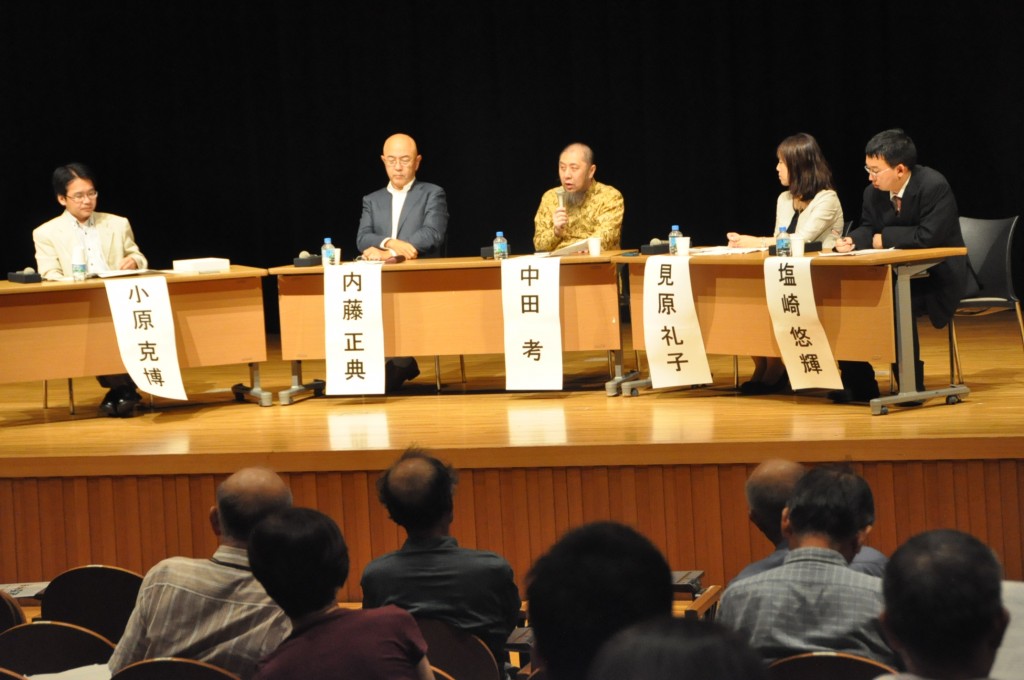Center for Interdisciplinary Study of Monotheistic Religions(CISMOR)Doshisha University
> Public Lectures > イスラームと西欧近代の問題 ―共約不可能性と共存可能性を突き詰めるPublic Lectures
CISMOR Public Symposium
イスラームと西欧近代の問題 ―共約不可能性と共存可能性を突き詰める
| Date: |
2012/09/15 14:30− 17:30 |
|---|---|
| Place: | Hardy Hall at the Kambaikan, Muromachi Campus, Doshisha University |
| Lecture: |
Lecturer: -Masanori Naito, Prof./Dean of Graduate School of Global Studies, Doshisha Univ. -Ko Nakata, Visiting Senior Research Fellow at the Research Center for Peace and Development in Afghanistan, Doshisha Univ. Commentator : -Reiko Mihara, Assistant Prof. of Graduate School of Global Studies, Doshisha Univ. -Yuki Shiozaki, Assistant Prof. of School of Theology, Doshisha Univ. Moderator : -Katsuhiro Kohara, Prof. of School of Theology/Director of CISMOR, Doshisha Univ. |
| Summary: | |
|
On September 15, 2012, a CISMOR public symposium titled “The Issue of Islam and the Modern West” was held, featuring lectures by Professor Masanori Naito and Dr. Ko Nakata. This symposium provided a good opportunity to confirm the inappropriateness of applying the Western model to Islam and to ponder the possibility of Western and Muslim societies coexisting in harmony. Professor Naito delivered a lecture on “Islam and Secularism―Exploring a way to enable a shift from incommensurability to harmonious coexistence,” in which he first addressed the Islamic scarf controversy in France, the Afghan issue, and the Syrian issue, which are directly relevant to the theme of his lecture. According to him, the incommensurability between Islam and secularism is most apparent in the scarf controversy among these issues. Secular nations do not allow private individuals to bring their religious symbols to the public sphere. In fact, the French government passed a bill that bans religious symbols in public places, and the typical “religious symbols” for French people are scarves worn by Muslim women. However, for Muslims, scarves are not religions symbols. This means there simply is no common ground for discussion between them. Next, Professor Naito discussed more fundamental issues. The first issue is law. The ultimate law for secular nations and Muslims is, respectively, human law (constitution) and divine law. The second issue is nation-states. Awakened Muslims have begun to deny the nation-state system that is based on citizenship and nationalism. The third issue concerns secularism and the progressive view of history. Western nations regard the establishment of a national system based on secularism as “progress,” while considering the Islamic system to be anachronistic. On the other hand, Muslims have begun to deny modern Western thought. For this reason, forcing the modern Western model on Muslims can only intensify the antagonism between them. Lastly, Professor Naito referred to the possibility of harmonious co-existence between Muslim and Western societies. He indicated that the following four conditions should be met if co-existence is to be achieved: (1) both Western nations and Muslims should recognize that it is no longer feasible to pursue the establishment of a nation-state in a manner in which the modern Western states were established; (2) Western nations should stop provoking Muslim society by raising logically incompatible “issues;” (3) Western nations should not try to invade and control others using the logic of state sovereignty; and (4) Muslim society should remove and change the impurities that arose in the process of introducing the quasi-modern Western state system, and to do so, should pursue the establishment of Islamic governance system based on correct Islamic logic. Following Professor Naito, Dr. Nakata delivered a lecture titled “Everything is about politics and everything is about religion.” He first denied the conventional wisdom that politics and religion are inseparable in the Islamic world. While God is at the center of everything in Muslim life, politics and religion came to perform different social functions already at an early stage of the history of Islam. According to the understanding of Sunni Muslims, no one has been granted absolute authority since the death of the Prophet Muhammad, and successive rulers have only been responsible for making decisions on secular matters. In this sense, the “separation of politics and religion” has long been in place in the Islamic world, though in a manner different from the West. Dr. Nakata also indicated that the image of Islam portrayed by newspapers and other mass media is not a correct reflection of the reality of Islam. In fact, the Muslim Brotherhood and the Organization of the Islamic Conference take an anti-Islamic stance rather than a pro-Islamic one. Islam has nothing to do with the actions taken by Muslims in this real world, but it exists objectively reflecting the will of God. Then, what is Islam all about? Islam is complete submission to God. As a purely monotheistic religion, Islam does not allow people to submit to anything but God. Today, however, people are customarily and almost automatically submit to the authority of the state. As typically shown by our birth registration system, everything in our life is now placed under the control of the government. This is a newly arising situation. Due to such a situation, no one can be a true Muslim without denying the current state system today. In other words, Islam cannot be Islam without its involvement in politics in today’s world. Dr. Nakata concluded his lecture by emphasizing that the only way for Islam to ensure its survival is to take action to change politics. Following these lectures, a panel discussion was held with the participation of the two lecturers as well as Assistant Professor Reiko Mihara and Assistant Professor Yuki Shiozaki. This symposium was attended by almost 200 people, reflecting growing interest in the theme of the symposium. (Shunsuke Sugita, Research Fellow, CISMOR, Doshisha University) |
|
|
*This lecture will be given in Japanese *Admission Free, No Reservation Necessary. Organizer: CISMOR Co-organizer: School of Theology |
|
